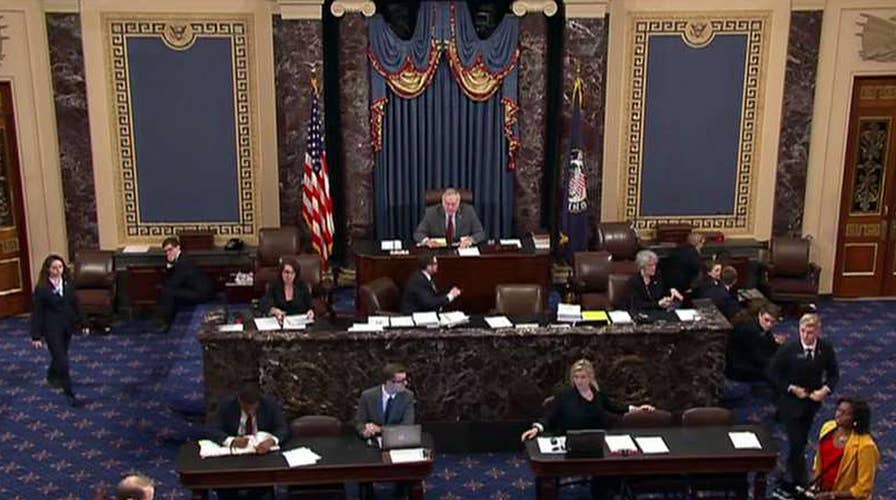Senate on the brink of landmark tax vote
CPA Daniel Geltrude comments on 'Fox & Friends First.'
It was like a nor’easter rolled in through the Senate late Thursday afternoon.
Nobody quite saw the cold front coming. The temperature plunged. The wind picked up. The barometric pressure dipped.
The Senate was just hours away from launching a lengthy vote series, culminating with passage of tax reform. And without warning, a legislative gale imperiled the chamber.
Republicans didn’t think much of motion by Sen. Angus King, Maine Independent, to try to sideline their party’s plan and zap the bill back to the Finance Committee for three days. But all of a sudden, the GOP found itself short of the votes necessary to euthanize King’s effort because their Sens. Ron Johnson, Wis., and Bob Corker, Tenn., had held out.
Two events defined the legislative squall that threatened to sideline tax reform.
First, Congress’s Joint Committee on Taxation released its evaluation of the GOP tax proposal. Congressional Republicans have long browbeat the econometric methods of the Congressional Budget Office when judging the fiscal impact of bills.
Some Republicans rip the CBO for using “static scoring” instead of considering real-world, kinetic factors represented under “dynamic scoring.”
They blamed the nonpartisan office this summer for producing what they thought were inaccurate forecasts about their health care bill. So Republicans were excited to see what the JCT would estimate using “dynamic scoring” to appraise the tax plan.
The committee determined that the tax cut measure would “not pay for itself” and add $1 trillion to the deficit. That’s better than the $1.5 trillion deficit window Senate Republicans allowed for in their budget blueprint. Still, the JCT analysis ticked off many Republicans.
“We don’t think they used the right dynamic model,” groused one senior Senate Republican aide.
Senate Majority Whip John Cornyn, R-Texas, complained: “I think they low-balled it. I think they’re wrong on the number.”
Remember that the GOP touted dynamic scoring as the magic elixir to get their numbers to work on tax reform. But this is a lot like baseball. If you don’t like the call, blame the men in blue.
“Yer blind, ump. Yer blind, ump. You must be outta your mind, ump!”
Another umpire on the field late Thursday afternoon was Senate Parliamentarian Elizabeth MacDonough.
Deficit hawks fretted about a possible debt explosion, which the government could incur if tax breaks strip revenue and economic growth doesn’t fill the void.
Corker and Sen. Jeff Flake, R-Ariz., hoped to create “triggers” to automatically switch on revenue streams if federal coffers ran low.
To avoid a filibuster, the Senate considered the tax bill under a special process called “budget reconciliation.” The process imposes guardrails to prevent against deficit spending. During the vote on the King amendment, MacDonough caucused in the well of the Senate chamber with a covey of senators and top aides.
She explained that the trigger concept violated the Senate’s special budget rules for tax reform and was dead. That could stall the Senate bill and cost the GOP several votes.
There’s always a way to overcome budget rules and rulings by the Senate parliamentarian. But such a gambit requires 60 yeas -- even under the budget reconciliation process that demands just a simple majority to approve bills.
The roll call vote on the King amendment meandered for an exhausting hour and two minutes, as Senate Republicans weighed their fate.
As the vote started, Cornyn even predicted that the Senate would finish the tax bill Thursday night. But he conceded that the parliamentary contortions to wedge triggers into the tax bill was a “procedural high-wire act.”
At the same time, Johnson pushed for additional deductions for small business incomes. By the end of the vote, Republicans faced a daunting task: revamp the tax measure overnight to court the likes of Corker, Flake and Johnson.
Otherwise, Senate Republicans were destined to fall short on tax reform -- just as they did on health care in July.
The cold front had moved in. The legislative oscillation signaled change. So Senate Majority Leader Mitch McConnell, R-Ky., sent home senators. Staff would stay to retrench legislative language to satisfy concerns of skeptical senators.
Senate “scorekeepers” would be up all night, weighing the costs and economic effects of new provisions for the bill. White House Legislative Affairs Director Marc Short made a quick visit to the Capitol to meet with the brass about the state of play. Short would keep President Trump apprised of changes to the bill.
The scramble was on.
Come Friday morning, it appeared the Senate GOP was in far better shape than when the legislative nor’easter blew in Thursday afternoon.
Sen. Steve Daines, R-Mont., announced his support on Fox News. Johnson held out on the deductions for small business. Those deductions had improved from 17.4 percent to 20 percent in the new bill.
But Johnson helped negotiate a boost to 24.3 percent, which moved him into the yea column. Republicans knew they had at least 51 yeas for the bill when Jeff Flake announced his support after the bill was altered to address his deficit concerns.
It was not a question of whether the Senate would approve the tax bill. It was an issue of when.
However, one GOP senator remained: Corker.
Republicans in fact didn’t need the Tennessee Republican. But a little cushion on the vote -- and unanimity -- would be nice. Late Friday afternoon, Corker declared he’d be the lone Republican nay.
“It just came down to the bump-up between fiscal issues and my concern about the long-term debt, he said.
Corker also said he informed Trump of his decision, and that the president still pushed him to get to yes.
The Senate may not have closed the vote on the tax bill until 1:51 a.m. Saturday. But with Corker’s announcement, senators sealed the vote tally at 51-49 on the tax bill at about 4:45 Friday afternoon.
There were rumblings mid-week that one or two moderate Democrats facing tough re-elections in Republican or battleground states may join the GOP and vote yes on the tax bill. But it was by clear late Friday that no Democrats would vote aye.
One conservative Democrat embroiled in a challenging 2018 contest said he believed President Trump wanted Democrats to get to yes. But in the end, no Democrats could vote yea because McConnell “deliberately tried to make the bill so bad none of us could support it.”
In other words, it was politically advantageous for McConnell to make it impossible for Democrats to vote yea – then bludgeon them in the 2018 campaigns with their nay vote in states where the President is popular.
“There was not a single Democrat who thought this was a good idea,” said McConnell about the tax bill just after 2 am et.
Democrats could be looking for ways to spin their nay votes. By the same token, Republicans are weaponizing the vote against vulnerable Democrats.
Though there was little drama surrounding the early morning vote, Vice President Pence still journeyed to the Capitol to preside over the Senate and announce the tax bill tally.
It was clear that Pence wasn’t needed to cast a tie-breaking vote on the bill, though he did cast a ballot to break a tie on one amendment.
Vice Presidents have only broke 258 tie Senate votes in the history of the republic. Pence hasn’t even been on the job 11 months, yet he has already broken six deadlocks. Democrat Joe Biden never broke a tie in the two terms he served as vice president before Pence. Republican Vice President Dick Cheney broke seven ties in his eight years on the job.
Now the hard part begins. The House has approved one version of a tax bill. The Senate, another. Lawmakers must fuse the legislative variants into a final, unified bill to send to Trump to sign. They hope to accomplish this before Christmas.
One can only imagine how many legislative nor’easters will blow through Capitol Hill, threatening to derail tax reform between now and December 25.












































